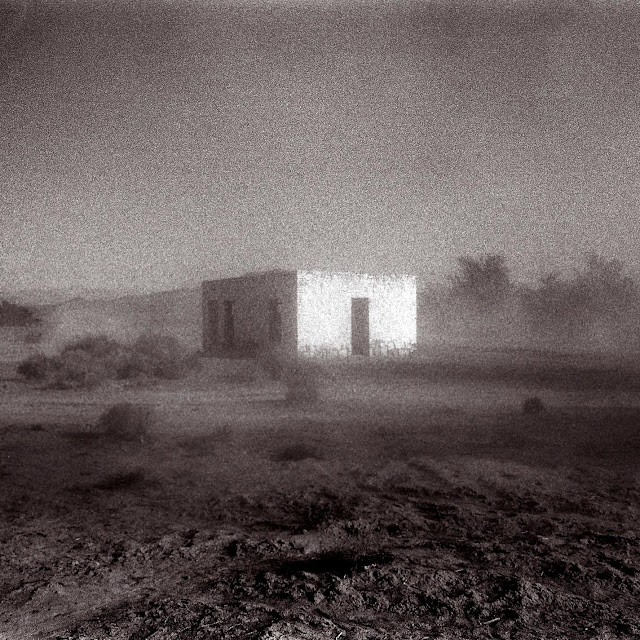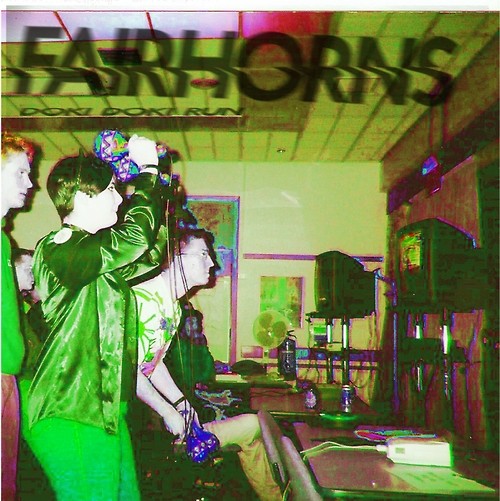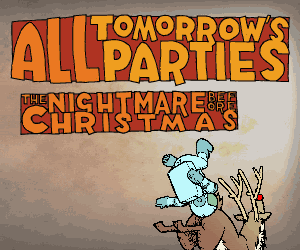 Amidst the labyrinth of barren dressing rooms that constitute the fifth floor of London’s Royal Festival Hall Dots & Dashes fave Karin Dreijer Andersson (aka the delectable anti-hero of this year, Fever Ray) sits soberly, cross-legged in the dark. Remarkably at ease for a debut UK gig and her fourth show ever under current moniker, the expansive corridors are lined with a veritable Scandinavian electro monarchy, from chart-battering princes and tonight’s headliners Röyksopp to edgy (fringed) Swedish starlet Robyn. The exclusivity of Ether Festival’s Saturday night fever merits a similar level of anticipation to the majority of this year’s summer weekends and with only a handful of dates lined up, Karin stripped down the tribal masks and face paint to talk touring phobia, Guns’n’Roses and a vital update on the future of The Knife.
Amidst the labyrinth of barren dressing rooms that constitute the fifth floor of London’s Royal Festival Hall Dots & Dashes fave Karin Dreijer Andersson (aka the delectable anti-hero of this year, Fever Ray) sits soberly, cross-legged in the dark. Remarkably at ease for a debut UK gig and her fourth show ever under current moniker, the expansive corridors are lined with a veritable Scandinavian electro monarchy, from chart-battering princes and tonight’s headliners Röyksopp to edgy (fringed) Swedish starlet Robyn. The exclusivity of Ether Festival’s Saturday night fever merits a similar level of anticipation to the majority of this year’s summer weekends and with only a handful of dates lined up, Karin stripped down the tribal masks and face paint to talk touring phobia, Guns’n’Roses and a vital update on the future of The Knife.Dots & Dashes: They say you should never meet your heroes. This is one of those moments but here we are anyway. Who would you say were your heroes whilst growing up?
Karin Dreijer Andersson: Cyndi Lauper, she was the most predominant figure for me. I bought her first single when I was about eight. And then a little bit later on I was really into Guns’n’Roses.
Dots: I can’t say any noticeable influence has been taken from hair metal…
K: No. But ‘Appetite for Destruction’ was a fantastic album.
Dashes: Do you feel that the records you’ve fallen in love with have inspired the music you create today as well as that previously conjured up as one half of The Knife?
K: I don’t really know but I think Cyndi Lauper was certainly a very positive artist for a young girl. She expressed herself in an extremely free and open manner. Nowadays if you’re eight years old the music that appeals most revolves almost entirely around the female body as an object. Cyndi Lauper had something else, she focussed on fantasy and creativity.
Dots: In terms of the Fever Ray record, who would you cite as the influential artists behind your progression from the goth-trance dulcet ecstasy of ‘Silent Shout’?
K: I would say I’ve probably watched more films during the conception of this record over the last year than I’ve spent time listening to music.
Dashes: Presumably films fairly distant from the mainstream; the record provides such an intense, minimal experience that it’s at times difficult to completely digest…
K: I spent most of my time watching Spanish and Korean art house films as well as a substantial amount of Jim Jarmusch’s early work. I think the album projects glimpses of these films in its attempts to retell story and fantasy. I like creative outputs that feel detached from Westernization.
Dots: In that case do you regard this album as being comparable to soundtrack?
K: It could well be, yes. It certainly soundtracks the specific time in which I wrote and recorded it. I feel particularly close to it; it took around a year to complete, working all day every day back home in Stockholm.
Dashes: How do you feel things have changed since working with Olof, creating The Knife’s three records?
K: The only considerable difference I feel is that I no longer work with my brother. The working process is similar but I’ve had to learn how to work on my own. Three different producers helped me out with the final production but I did all the programming singlehandedly.
Dots: Having worked so closely with your brother previously, was it difficult to return to music by yourself?
K: Yes it was. I’d been working with him for seven years and it was a very intense period of time so I didn’t really remember what it was like to work without anyone else. At first, I just wanted to see if it worked. I didn’t have any plans regarding this album. Effectively, I just went into the studio to discover for myself what would happen. After a while, I actually started to revel in my solidarity and I think that’s where the soul of this album stems from.
Dashes: How do you feel your Swedish secluded small town upbringing and backdrop has affected what you’ve done over the years?
K: It took us seven years to venture onto a stage and even then we only ever performed 22 shows, just because we hated the live setting. The idea of a live show in which we’d reproduce an electronic album seemed entirely pointless and I still don’t understand the purpose of playing out programmed music live by hand. I feel it destroys everything but then after about seven years we started to talk to [Swedish artist and director behind music videos of everyone from White Lies to Moby] Andreas Nilsson about the live show and he had a load of creative ideas that really appealed to us. He then talked us into it, enticing us in with graphic projections and colossal screens, saying theoretically we wouldn’t even have to turn up.
Dots: So effectively taking the focus away from the music?
K: No, still focussing on the music but taking the importance away from the artists themselves whilst keeping the creative side of things in the foreground. That’s what I find most interesting about live shows.
Dashes: Perhaps another substantial differentiation between work produced by The Knife and the latest record is the way in which the vocals have been laid down; clarity seems to dominate this time but they’re still all in English. At what point did you decide to write in English rather than Swedish or any other language and how much of a conscientious decision was that?
K: I’ve never written anything in Swedish! I think it’s a completely natural aspect of my music that the lyrics are all in English; there is music in Swedish back home but it’s fairly hopeless.
Dots: Focussing on another distancing factor from The Knife, where once your identity was hidden behind Venetian masks and vocoders diverting interest away from the artists behind the music, do you feel your appearance has been altered for this outing?
K: I don’t think so. I’m trying to use myself more in order to disguise myself, using costumes that reflect the music. I believe I’m trying to follow the music symbolically with my body.
Dashes: Would you say it’s perhaps a more open approach?
K: (the lengthiest pause of the afternoon is incurred, followed by a solemn, cold-blooded, one-word response) No. I think I have a firmer understanding these days of where the line is between Fever Ray and my own privacy. I’m intrigued to discover exactly what I can do with myself, painting my face and concealing myself within elaborate costumes whilst retaining every shard of relevance retained within the music. In short, I don’t think it’s more open, no!
Dots: This is your debut UK show. What’s made you decide that maybe it’s ok to get out on the road? There are a fair few dates lined up…
K: I find it far more enjoyable now. I felt that The Knife club tour we did back in 2006 provided a very efficient warm up and I think both Olof and I have become really interested in the performance art side that our music holds. It now feels like a completely revolutionary experience to be collaborating with a band of five or six musicians with whom I’ve rehearsed with since November and Andreas [Nilsson] has been lending a hand with the subdued scenery we’re using so it’s a really creative final production. I found the recording process extremely isolated so it’s exciting to be working with people again!
Dashes: Do you feel a sense of security touring with Röyksopp, having collaborated with the duo in the past? And both being Scandinavian, of course…
K: Believe it or not, I’d never played with them live before last night. It went well!
Dots: Do you think your perceptions of touring differ from the majority of young bands who can afford to record and tour and record and tour until they achieve a top ten album without the sort of foundations in life you’ve established, being a mother of two amongst other things?
K: I certainly feel that touring is a bit of a hassle and I try to cut down on the amount of time I spend away from home but at the same time that’s why doing festivals every other week during the summer offers a solution to that predicament, as I can be at home for the majority of the time. My family in Sweden constitutes the predominant reason we don’t tour for months on end. We’re very exclusive!
Dashes: So you feel it restricts you in a way…
K: No, it’s a grand production when you’ve taken into account the band, crew, lasers, set design and everything else even when we’re supporting. I don’t want to play if I have to compromise. It’s all or nothing! But it makes it pretty expensive to book us so not all that many can afford us. It’s ok because we don’t have to put on nearly as many shows!
Dots: When the summer months roll around the corner, presumably you’ll have to cut down on these extravagant shows…
K: No, they’ll be exactly the same. And we have to play when it’s dark which makes everything more problematic once more, even if it gets us higher up the bill!
Dashes: Are there plans for any further UK shows or is this a distinct one-off?
K: There’s a more club-oriented European tour in the pipeline for the autumn that’ll be along the lines of The Knife tour in 2006 and maybe a festival appearance or two before then…
Dots: Finally, having done your 22 shows under the banner of The Knife, would you say a fine line has been drawn under the future of the greatest cutlery-inspired act since Spoon or are there revelatory plans to be unveiled from the Dreijer siblings?
K: Far from it; Olof and I have been working for a year on both the music as well as the libretto for an opera based on the life of Charles Darwin. He moved to Berlin three years ago which surprisingly made things easier as I visit him for three days and then vice versa as we both have home studios. It will be premiered in September and after that (lowers voice) next winter we’ve talked about making a proper Knife album.























